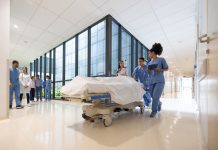John Whitehead, CEO of Exemplar Health Care, discusses specialist adult care and how to continue delivering post-COVID
shares his reflections on what lessons we’ve learned from COVID-19 and how changing public opinions are helping to shape the future for adult specialist care providers.
Since March 2020, care homes across the UK have reported cases of COVID-19. At Exemplar Health Care, sadly we have lost some of our residents. But our primary focus is and will always be, to deliver high-quality care for our residents and provide a safe working environment for our colleagues.
Fortunately, coming into the pandemic, Exemplar Health Care was in a positive position which enabled us to take swift investment decisions to protect our residents and colleagues. We were in a good place financially, we had a dedicated team of colleagues with low turnover rates and had well-established quality assurance processes and systems already in place.
Early intervention ensured that we secured Personal Protective Equipment (PPE) through global suppliers, meaning that we had enough supplies to protect our staff.
Exemplar Health Care has shown great resilience throughout these challenging times and there are a lot of lessons that we can take away, as we start to think about moving forward.
Introducing processes that can be continued post-COVID
When you’re driven by necessity, it’s amazing how quickly you can adapt. And a lot of the changes that we’ve made over the past few months, will continue to support the business in the future.
During the pandemic, we’re continuing to innovate by introducing new technology across our network, to help manage and maintain staffing levels.
The COVID-19 pandemic has placed a great pressure on the health and social care sector, which has resulted in the need to recruit additional staff. In response to this challenge, we’ve implemented a new online dashboard that provides real-time information about staffing levels across our homes. When colleagues enter and leave one of the care homes, they’re required to sign in and out on an iPad. This information feeds into the dashboard and is updated every 15 minutes; providing the Operations Team with a real-time view of how many colleagues are in each home at any given time.
This is a much more efficient way of tracking staffing levels as it has reduced the number of emails and phone calls with Home Managers, meaning that we all have more time to spend supporting our residents and colleagues.
Lockdown also posed huge challenges to the way that we usually deliver induction and training, however, we made new ways. Our Learning and Development Team took swift action to adapt our induction process for new starters, and built on our existing eLearning platform to ensure that everyone can continue to learn and develop in their role, which, in the long-term, will only complement our already robust learning and development programme.
Changing opinions of social care
Social care has shown incredible resilience throughout the pandemic, despite not having the same support and funding as the NHS. And each week, as we stand on our doorsteps and #ClapForCarers, I feel encouraged that more and more people are seeing social care as an equal to our health counterparts.
The media attention throughout the pandemic has gone some way to highlight the social care sector, along with its position as ‘number two’ to the NHS – but this needs to change.
I believe that the overall social care operating model will be unchanged by COVID-19 and core failings of funding for the social care sector are likely to continue without a concerted Governmental effort.
The challenges that the sector faces post-COVID are likely to further emphasise the gap between lower and higher acuity care.
The fact remains that, despite the funding challenges that the sector faces, the adult specialist care that Exemplar Health Care provides cannot be commoditized – it needs to be bespoke and tailored individually to each person.
Sadly for other providers, such as elderly care and domiciliary care providers, these challenges might have the opposite effect whereby care becomes increasingly driven by commoditised pricing.
Future change is being helped by the public’s increased attention on the challenges facing the industry. This current, heightened public engagement is, however, now set against a challenging fiscal future.











